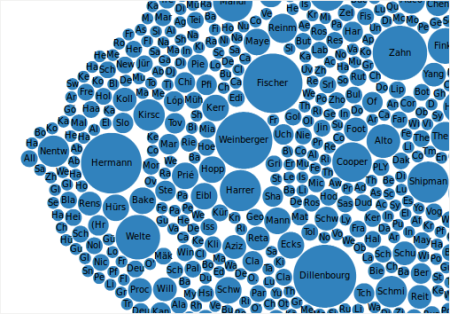Mendeley is valuable tool to organize and annotate scientific literature. As power user you can get lost in paper space because Mendeley does not offer any tools keep track with all the collected metadata. Having more then 500 articles, book chapters and books in your collection makes it quiet difficult to overview relationships between authors/co-authors, publishers and keywords.
Luckily Mendeley does not protect its local database on desktop computers. So its theoreticly possible to build an alternative to Mendeley but for the mentioned disadvantage its fare enough to collect some resonable data for meaningful visualisations.
As a first example I will present some source code and visualization that gives you an overview about the quantity of authors and co-authors. Especially co-authors do not get that much attention while they play an important role, e.g. as senior scientist that tie generations of young researchers together.

Surprisingly I discovered some new names that seem to play a bigger role in my research filed as expected.
Technically the visualization is based on a simple bubble chart from the D3.js examples. The SQLite-Database can easily viewed with tools like “SQLite Database Browser”, available for Linux. The conversion of the data could be done with the script language of your choice. I put in php to generate some json code for D3:
< ?php
header('Content-Type: application/json');
if ($db = new SQLite3('your-mendeley-sqlite-file')) {
$result = $db->query('SELECT lastName, firstNames FROM DocumentContributors');
$row = array();
$i = 0;
while($res = $result->fetchArray(SQLITE3_ASSOC)){
$row[$res['lastName']] ++;
$i++;
}
$data = array('name' => "flare");
$authors = array();
foreach($row as $key => $val){
array_push($authors, array('name' => $key, 'size' => $val););
}
$data['children'] = $authors;
echo json_encode($data);
} else {
die($err);
}
?>